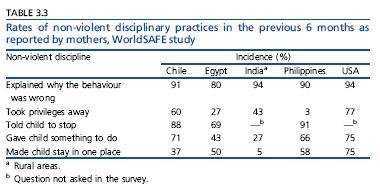
The purpose of discipline is to encourage rather than forcing children to do what is right….
- Establish firm and clear rules
Rules should tell children what to do rather than what not to do.
Do you know that even us, adults, DO NOT ‘recognise’ the word “don’t“?
Try this experiment…
Find anyone whom you consider an adult. Let the person sit down, close his/her eyes. Now you tell the person, “Don’t think.. never think… must not think… cannot think…DO NOT even try to imagine……………………a Tiger.”
Guess what pops right out of the person’s mind? A tiger! Somehow, human brains focus on the subject, the topic, the action….
So when you tell your child …. “Don’t run!”, he/she hears “run!”
Try to say … “Stop! Walk.”
And when you tell your child…. “Don’t hit your brother!”, he/she hears “hit your brother!”
Try to say….”Stop, put your hands down. Ask your brother for the toy.”
This has been working for me for as long as I remember…just avoid “Don’t, never, can’t, mustn’t”. Give the direction to do what is right, not instruct to not do what is wrong.
When you tell the child, “Stop!” doing what is inappropriate, you need to “replace” the inappropriate action with the correct behaviour.
Don’t just say…”switch off the Television, right now!” without giving another action to replace this.
Try to say…”Switch off the Television, right now, let go to the kitchen, I need your help to get dinner ready”
In this way, the child knows what to stop doing and what to do next. He needs direction, especially for kids below 5 years old, in order to give you his cooperation.
Children need limits to their behaviour to learn what is expected of them and how they should act.
They may be unhappy and confused if they do not understand what is expected of them or when they see the rules as being unfair.
Rules should be fair, easy to understand and be backed up with consequences if they are broken.
Disciplining gets easy as the child gets older. He is more aware of the consequences of any misbehaviour if you have been consistent in your responses to his undelightful action.
This means being predictable so children will know what to expect when they behave in certain ways. It is of little use to laugh at their behaviour one day and then discipline them for the same behaviour several days later.
Confusion leads to incooperation, hence leads to frustration. So stick to the rules which you and your spouse have agreed on. It may be a little hearbreaking to see the cute little eyes turned red, but its a long term prevention for future more serious misbehaviour.
Remember, disciplinary measures need not be violent or physical when you understand why your child misbehave.
Report taken from World Health Organisation


Copyright © 2007-2024 All About Your Child. The contents on this blog are the sole property of the author, Angeline Foong, and may not be used or reproduced in any manner without consent. All Rights Reserved.






